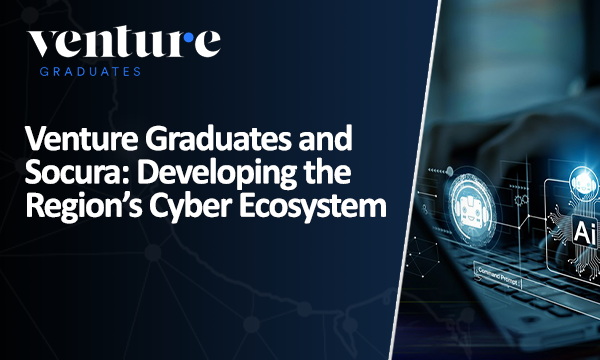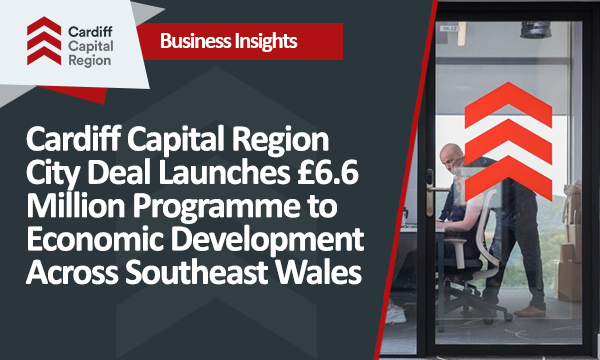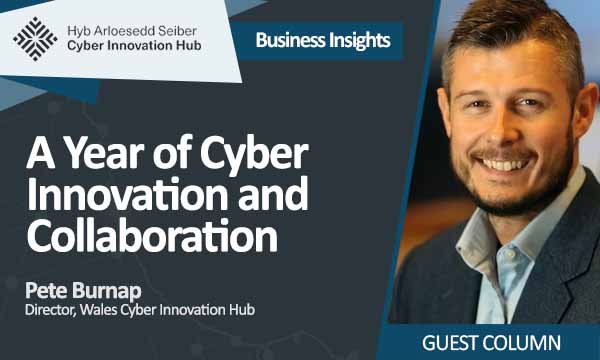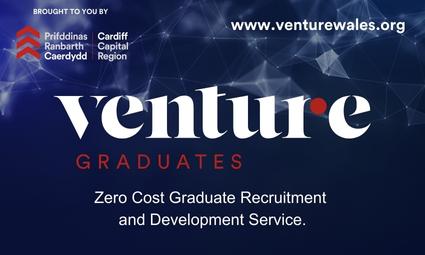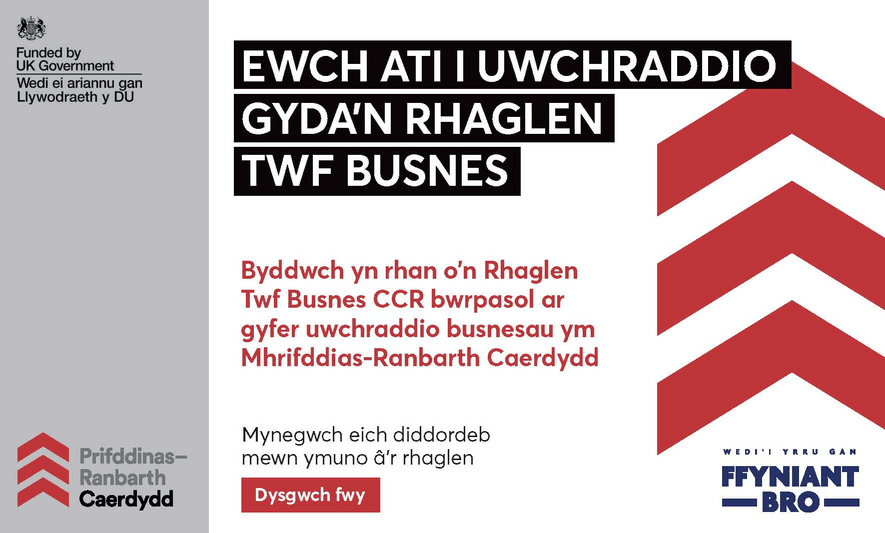Last week we began to detail The Cardiff Capital Region ‘Five for Five’: the five key priority areas that will be hallmarks of CCR’s evolution over the next five years.
Introducing the five main ‘pillars’ that will build and support sustainable inclusive growth right across our region, by taking CCR beyond a City Deal, enabling us to develop a series of interconnected initiatives that will together deliver a wider and more holistic agenda, based on five main imperatives:
- Building Back Better
- Becoming a City Region
- Scaling Up
- Levelling Up
- Developing Economic Clusters
In our previous article, we scoped our plans for Building Back Better and Becoming a City Region – and in this final feature of ‘Reimagining Our Region’, we’ll scope how CCR has the opportunity to Scale-up, Level-up and Develop Economic Clusters, to create the inclusive growth needed for every business and all communities right across South East Wales.
We’re moving from starting-up to scaling-up
Pillar 3: Scaling-up
‘Scaling-up’ was already at the heart of the City Deal, in our commitment to building capacity across our region through delivery of our Wider Investment Fund projects. It’s fair to say that a large part of our first four years has been spent ‘starting-up’, but subsequent to the launch of our Investment and Intervention framework, we have quickly developed a pipeline that now includes 11 approved projects with more at an advanced stage of development. Our approved projects which are at varying stages of delivery include:
- CCR Graduate Scheme
- CSC Foundry
- CSconnected
- Metro Plus
- Metro Central
- Creo Medical
- Homes for all the Region
- Challenge Fund
- Zip World Outdoor Adventure Project
- Pharmatelligence
- Strategic Premises Fund
Beyond this approved delivery pipeline, we also have a number of other projects in development – including our pioneering cluster projects for CCR Creative Industries, Cyber Wales and Fintech Wales plus new funds for Innovation growth. Each of these projects demand quality delivery and, in effect, new governance structures that measure the contribution of each project against both core targets and higher level policy goals.
Stimulating the pipeline and developing the deal flow, through quality delivery and a new governance
Stimulating new proposals will continue to be important for both the City Deal and City Region development – continuing the split of public-led interventions that serve the whole region, alongside more targeted private-led projects which align with markets and demand. One of the key City Deal targets is to generate £4bn of private leverage with the approved projects currently projected to deliver approx. £2.5bn of this. However, this is just the start.
Frank Holmes, Chair of the REGP and Investment Panel said;
“Many more projects are now coming to the fore, bringing new public and private leverage through sources such as the UKRI Strength in Places Fund. CCR will continue to leverage public funds by increasing our application rate to the UK Government and commit to further HEI collaboration – building the partnerships and R&D intensity to continue generating high levels of private leverage.”
Current approved projects project a leverage of £2.5billion towards the £4billion target
This whole process of scale-up means a step-change in how CCR does business – and we’ve undertaken the Investment and Intervention Framework (IIF) self-evaluation to help us set-out the assessment process for the Wider Investment Fund and the CCR Assurance Framework. Continuing the evolution of our partnership structures, succession planning and continuity planning will also be key as CCR makes the transition to new forms of regional economic governance and builds new types of institutional capacity. In truth, the current governance structure is simply too dense – so we need to streamline and improve our overall programme effectiveness, especially now that our journey to Corporate Joint Committee status has begun.
Evolving partnerships and governance will be key
Pillar 4: Levelling-up.
‘Levelling-up’ has made national headlines as a major policy commitment of the UK Government. Given the regional disparities in the UK around everything from productivity to R&D output – and the probability of COVID-19 exacerbating these existing inequalities – CCR has a major opportunity to put in a place a clear vision for ‘Levelling-up’ in South East Wales.
Kellie Beirne, Director CCR City Deal spoke for us all when she recently stressed that;
“With the prospect of harnessing place-based funding settlements to tackle innovation inequalities, it’s more critical than ever that CCR has a coherent, clear and comprehensive approach to defining its’ requirements to level up prosperity across the region.”
We’re doing exactly that, by:
Publishing a CCR Investment Prospectus – “Prosperity for our Place”
The Covid-19 pandemic and economic recovery offers us an opportunity to solve industrial and societal problems – by firing up imaginations and engaging communities, businesses and learning institutions to build back better. In many ways, CCR is in itself an example of ‘Levelling-up’ – with robust credentials in how to judiciously deploy a funding pot. Our Investment Prospectus to UK Government has built on the intrinsically-linked pillars and sector strengths that already characterise CCR – with 6 core cluster orientated proposition requirements and 5 enabling propositions for proposed exploration and intervention setting out, in an evidence based way, the potential of CCR to contribute to both the Welsh and wider UK economies
An Investment Prospectus built on a comprehensive set of requirements and results.
Defining our infrastructure policy position and investment requirements.
We’re setting out our clear policy position and investment requirements on Transport – enabling governments to clearly understand the infrastructure projects that are best placed to support our economic growth, local wealth creation and increased productivity across every community. This position will focus on rail, bus and active travel in particular – and further highlight the significant opportunity we have in the CCR around decarbonisation of transport systems and the prospects for opening up far greater accessibility and mobility for everyone in the region.
Becoming more mission-driven and challenge-led.
By building on the success of the challenge fund for Local Wealth Building and the high success rate of SBRI in Wales, we’ll continue to launch and deliver challenge funds that offer new solutions to the big challenges of our day – Climate, Mobility, Ageing, Data and AI.
New solutions to the big challenges of our day – Climate, Mobility, Ageing, Data and AI.
Leveraging the data and digital credentials of the region.
Large amounts of UK Government data are stored across our region in places such as the Office of National Statistics, Intellectual Property Office, Companies House and Department for Work & Pensions. We can use this data to help us solve our economic and societal problems – and become more resilient to future ‘shocks’. This work is already beginning to be developed through our work with the Data National Accelerator work and a number of ‘software academy’ initiatives.
Kevin Gardiner, CCR REGP Board Member and Global Investment Strategist at Rothschild:
“The data held in the region is more than a support for evidence-based decision-making and more than a useful measure for our competitiveness. It’s an asset and valuable resource in its own right – something that can be commercially leveraged as well as helping reinforce our digital credentials.”
Pillar 5: Developing Economic Clusters.
The UK Government has set a target for 2.4% of national spend to be invested in R&D by 2027. So it’s a sobering thought that CCR levels of public R&D investment are below 1% (with just Cardiff nearing 1.1%) and a Nesta report also telling us that Wales loses out to the tune of between £400-600M per annum on R&D investment.
We have proven strengths in innovation
CCR possesses proven strengths in innovation, but evidence shows these successively fail to convert to ‘innovation outcomes’. This is because we do not have the structural conditions and systems in place to support the eco-systemic growth that delivers high-order jobs and strong productivity. With the COVID-19 focus highlighting the necessity of creativity and innovation, the time is doubly right to set out a strategy and approach for CCR to contribute to the UK R&D Roadmap.
Karen Thomas, Head of Barclays Corporate and REGP Board member said,
“Businesses that survive over the long term are those in which innovation is ingrained as the norm. In Wales generally the level of investment in R&D and innovation is too low. We can’t afford to let that continue if we want to build that resilience we seek in Cardiff Capital Region.”
We’ll achieve this by:
Establishing the CCR Clusters Framework that sets out our evidence by identifying priority clusters and mapping the stage of each cluster or prospective cluster. The framework will guide innovation investment, highlighting R&D capability and gaps – and bringing FE, HE, business and public sector partners together around the right conditions. This in itself will unleash the huge potential of business and academic collaboration.
By way of example to demonstrate the size of the prize,
Jon Wood, CCR Strategic Lead Clusters said;
“The Cardiff Capital region has more than 200 businesses working in the medical technology field. Along with its three universities and access to both the world’s first compound semiconductor cluster and NHS Wales, it makes for a strong and vibrant cluster operating in a supportive ecosystem. So imagine what could happen if we connected the cutting-edge businesses that are already here with the future of electronics, and provided the resulting innovations an easy route into the NHS.in the field. Along with its three universities and access to both the world’s first compound semiconductor cluster and NHS Wales, it makes for a strong and vibrant cluster operating in a supportive ecosystem.”
Creating a CCR Innovation Investment Fund. This proposed fund, which is currently in development, will be around £100M (inclusive of co-investment) and will underpin the clusters’ framework as well as other innovative proposals aligned to meeting grand challenges. This will support the public investment in innovation – bringing in additional private and research investment, as well as strengthening the region’s credentials.
Frank Holmes, Chair REGP and Investment Panel said,
“The focus will be more on scale- up than start -up. It’s about helping those companies that are involved in our sector strengths like Compound Semiconductors, Energy and the Environment and Medtech. However, it would not just be for our incumbents, the real success of our clusters will be when other companies from outside the region want to join them. That’s when the ecosystem will really gather strength and momentum. So we are prepared to look at companies wanting to come into the region and need scale-up capital to enable them to take products to market and improve their innovation capabilities.”
Better answers need better questions
Making CCR the ‘go to’ place for challenge-led development. Better answers need better questions. And better questions rely upon fresh thinking, perspectives and a willingness to explore the ‘unknown unknowns’. Challenge Funds inspire and invite this fresh thinking by bringing together academic experts, business partners and challenge advisors – offering CCR the opportunity to harness the full knowledge, and capability in the region.
Engaging closely with the Western Gateway partnership. The Western Gateway geography spans the South West of England, taking in the whole of the CCR and Swansea. The area is home to sectoral strengths, shared connections across infrastructure and transport – and importantly, it also encompasses a number of ports which sit aloft the second highest tidal range in the world. We will engage as partners in this development, promoting our shared geography and unique strengths to the world – and collaborating on projects of shared economic interest and importance.
We’ll be first amongst the new wave of partnerships to be formed
Engaging in new international trade relationships and research arrangements. Post-Brexit, developing new trade relationships and new forms of international and inter-regional cooperation will be of vital importance. New ‘trade bridges’ through Cardiff Airport and new international research partnerships will develop a regional approach to Foreign Direct Investment and Inward Investment, building on the back of the ‘Invest in Cardiff’ brand already developed for stages such as MIPIM, ensuring we are first amongst the new wave of partnerships to be formed.
Supporting foundational economy renewal. The ‘foundational’ economy is simply vital to the prosperity of CCR – connecting the many different ‘ripple effects’ that run every day through supply chains and networks. The foundational economy is also evolving. Retail, high streets, care and hospitality are rapidly adapting, through COVID-19, to adopt knowledge-economy technologies and practices. We’ll continue to champion a challenge-led approach to local wealth building and support imaginative collaboration throughout this economy – as a critical part of our ‘5 for 5.’
Philippa Marsden, Regional Cabinet member and Leader Caerphilly Council said,
“We need to bring a new balance of employers to this region. That starts with a commitment to bringing well-paid sustainable work to this region – not just through the emerging high-skilled sectors such as, Compound Semi-Conductors, Fintech and Medtech, but also by reimagining what we do and how we do it in more traditional sectors. Take Housing and Construction for example. Why can’t we emulate the German modular style of construction that creates affordable housing, brings environmentally friendly energy efficiency – and creates a whole new skillset for a large workforce? Beyond that, why can’t we make Care a truly aspirational and well-respected career, a vocation that makes a real difference, for people who otherwise face no meaningful work? Again, this is an opportunity to bring real purpose to people’s lives – and we’re committed to making that happen, coming together as a region to build a new Wales.”
Taken together, these five pillars will support and drive the bold ambition of CCR over the next five years – and play a crucial role in our evolution from a City Deal towards a much broader and strategic approach that reflects and embraces the economic geography of the whole region.





